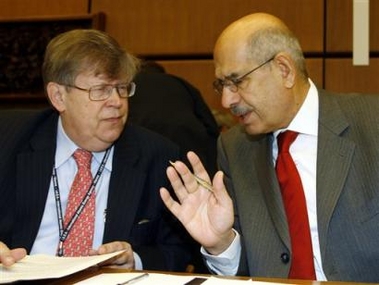|
Nuclear watchdog considers Iran referral
(AP)
Updated: 2006-02-02 21:46
The U.N. nuclear watchdog met Thursday to consider referring Iran to the
U.N. Security Council over its nuclear program, which the United States
and European Union believe is not "exclusively for peaceful purposes."

IAEA's Director General Mohamed ElBaradei,
right, talks to Deputy Director General of the International Atomic Energy
Agency (IAEA) and Chief U.N. Weapons Inspector Olli Heinonen prior to the
start of the IAEA's 35-nation board meeting on escalating nuclear standoff
with Iran, on Thursday, Feb. 2, 2006, at Vienna's International Center.
[AP] |
Positions
appeared to harden on the eve of the two-day International Atomic Energy Agency
meeting after European nations formally submitted a U.S.-backed motion for the
IAEA's 35-nation board to refer Iran to the Security Council.
Iran remained defiant, warning Wednesday that such action will provoke it
into doing exactly what the world wants it to renounce — starting full-scale
uranium enrichment, a possible pathway to nuclear weapons.
The IAEA board was expected to approve the motion easily because Russia and
China — which both have veto power on the Security Council — now support
reporting Iran following months of opposition.
Grigory Berdennikov, Russia's chief IAEA delegate, reinforced the Russian
position outside the meeting.
"We do not object against informing the Security Council" about what Iran
needs to do to meet international concerns about its nuclear activities, he told
reporters. "We consider that the board is sending Iran a serious signal."
Inside the meeting, chief U.S. delegate Gregory L. Schulte also called for
referral. "It is time to send a clear and unequivocal message to the Iranian
regime about the concerns of the international community by reporting this issue
to the Security Council," he said.
Washington has waited years for international suspicions over Iran's nuclear
ambitions to translate into support among board nations.
Speaking for Germany, Britain and France — the three nations representing the
European Union — German chief delegate Herbert Honsowitz told the meeting: "The
time now has come for the Security Council to get involved."
Still, board action could be delayed until Friday, possibly even Saturday.
Diplomats accredited to the meeting said the draft could still undergo
small-scale modification in protracted back-room negotiations to achieve as much
support as possible for referral before the board formally takes a decision on
the text.
Iran's decision Jan. 10 to restart small-scale uranium enrichment — and
Iranian President Mahmoud Ahmadinejad's recent calls for Israel to be wiped off
the map — apparently rattled Beijing and Moscow enough to support the U.S.
position. Iran became more insistent on its right to pursue a nuclear program
and less cooperative in talks with European negotiators after the election of
the hard-line Ahmadinejad last June.
The call for referral was contained in a confidential draft resolution
obtained by The Associated Press. It "requests the director general to report to
the Security Council" on steps Iran needs to take to dispel international
suspicion it could be seeking to manufacture nuclear arms.
The draft expresses "serious concerns about Iran's nuclear program" and notes
"the absence of confidence that Iran's nuclear program is exclusively for
peaceful purposes."
If the board approves referral as expected, it will launch a protracted
process that could end in Security Council sanctions for Tehran.
Still, any such moves are weeks or months away. Moscow and Beijing support
referral only on condition that the council take no action until at least March,
when the board next meets to review the status of an IAEA probe into Iran's
nuclear program and recommends further action.
Berdennikov, the Russian delegate, emphasized his country's position on the
delay, telling reporters Moscow "insists" no Security Council action be taken
before March.
|